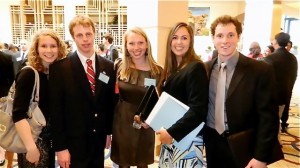Reflecting upon the experiences, I have come to realize that the talents that I ‘developed’ during my first year were actually well founded in my experience in MUN, both in high school and college. While legal writing is definitely a different kind of beast (I won’t bore you with that—you’ll learn what I mean in a few years when you sit in your first legal research and writing course), position paper research and resolution writing laid a strong foundation for my success in crafting sentences with conciseness and clarity. Funny, how back in the day, I would sit in front of a laptop during committee, mentally searching for another synonym to begin a perambulatory clause and dreaded every moment; now I am so very thankful for my MUN vocabulary and my ability to craft those “not so important” sentences…
Many students participating in MUN are interested in the law, which I think is a fantastic thing. In fact, I found my love of the law in MUN. I was 16-years-old, sitting in the International Law Commission (ILC) of the National High School Model United Nations (NHSMUN) conference, and found myself falling in love with the somewhat ambiguous language of legalese. From that weekend on, I always knew I wanted to be a lawyer.

- Just get up there and do it. You won’t believe how many law students hate getting up in front of a crowd and speaking. I was shocked when I learned this. I thought all lawyers were like Jack Nicholson in A Few Good Men, screaming to the court, “YOU CAN’T HANDLE THE TRUTH!” Ironically, more of my classmates would prefer to sit in an office and draft contracts for a living. Swimming upstream, I credit my ability to get up in front of a panel of 3-5 judges and argue the law to Model UN, which forced me to get up in front of hundreds of individuals at multiple conferences and advocate zealously for my country’s position. Why are most people afraid to get up and speak? I have come to find that most people are afraid of getting up there and not knowing the answer. If you are a former MUNer in law school, you need not be afraid of this. If it’s one thing MUN teaches us, it’s how to be quick on our feet. I have found myself only once speechless before a panel and that was only because the judge asked me about my family heritage in the middle of oral arguments (that’s pretty unheard of).
- Becoming a zealous advocate. My first conference I represented North Korea on the issue of the capital punishment—talk about a rough spot to be in. I was 14-years-old and barely understood what the UN even did. But I remember my advisor telling me, “Just go in there and stick to your guns.” That, right there, is exactly what the law is. You will find yourself advocating for things that you, personally, may not agree with. I think one of the hardest things for me was agreeing with a policy aspect of the law, but not agreeing with how the Supreme Court logically and legally got to the conclusion it did. There will be days that professors and colleagues will ask you to defend a position that you may find troubling or difficult to advocate for, but Model UN teaches you to remove your personal emotions and look at problems rationally and with research. It teaches you to stand firm in your position, whether you are negotiating for an operative clause in a resolution or if you are trying to gain support for your draft resolution. Those little skills you are collecting during an un-moderated caucus translate so very well into becoming a zealous advocate for your client and/or legal beliefs.
- Fierce Diplomacy. The law is a fickle friend sometimes and intersects with some very emotionally charged topics, including issues such as the constitutionality of same-sex marriage and universal health care. Professors, regardless of your emotional beliefs, expect you to be able to intelligently speak on these issues. I feel that those in Model UN have a great advantage over others when it comes to how to conduct themselves in these situations. You won’t believe how many class discussions took a turn for the worse because individuals got too hostile and unprofessional in responding to a classmate’s beliefs with respect to a contentious issue. While MUNers are taught the diplomatic ways to fight back in committee and may think nothing of it, I can’t tell you how much they will help you in your legal career. Judges are so much more willing to listen to your motions in court when you make them with respect, intelligence and an open mind. Working with other lawyers in court will be so much easier when you are perceived as diplomatic and respectful. While I am a younger member of my class, my friends remark about how emotionally levelheaded I am in class discussions. While I’d like to say that’s “just me,” I know perfectly well I learned that skill from MUN—advocate for your stance, but always, always diplomacy first.
- You can tie your own tie! You laugh at me, but I am telling you, it is quite remarkable to see people’s perceptions of appropriate business attire. Half of success in the legal career is you appearance—being well groomed, not wearing a heinous tie to an interview, and women, always wearing panty hose with skirts and business dresses. I am so appreciative of the business professional introduction MUN gave me in terms of business attire and etiquette. You never want to lose a job interview or argument in court because you decided to wear a lime green, crooked tie that you taught yourself how to tie thanks to the help of a youtube video you watched five minutes prior. Your friends in high school may make fun of you now for wearing a suit on the weekends and riding the bus to yet another Model UN conference, but I am telling you, you’ll be turning heads when you look sharp as a corporate attorney.
- Learning to Lead the Pack. The greatest gift MUN gave to me was learning my own potential as a leader. It taught me that effective leadership includes listening to those I am working with and helping to delegate group work. My experiences in Model UN have included a plethora of dais positions and conference staff positions, including Secretary-General of Model United Nations of the Far West (MUNFW), Chef du Cabinet of Mission Viejo High School MUN (MVHSMUN) and President of Cal State Long Beach’s Model UN team and program. I have even had a chance to co-teach a class on Model UN and politics of the UN! Not only were these experiences great assets to my resume (I think these experiences were a big factor in my admission to Northwestern Law), but gave me great skills in terms of group work in law school and assuming leadership positions with school organizations. It may seem nominal to list leadership as a critical asset, but it has become my greatest tool in my kit for law school success. Inside the classroom, organizing study groups, running conferences and activities—strong, diplomatic leadership skills that I learned from my delegate and staff experiences have been absolutely vital to my experience as a law student and advocate.
Whether you become the next great legal mind of the ICJ or ICC, a fierce legal shark in the corporate world, or a passionate advocate for individual rights, Model UN gives you the necessary skills for success as a law student and lawyer.
I am a firm believer in the idea that success if what you make of it. While there certainly is a little bit of luck that factors into it, you have to be prepared when that lucky moment strikes. Without the passion and the skills that MUN gave me, I would not have been ready when my lucky moment came.



